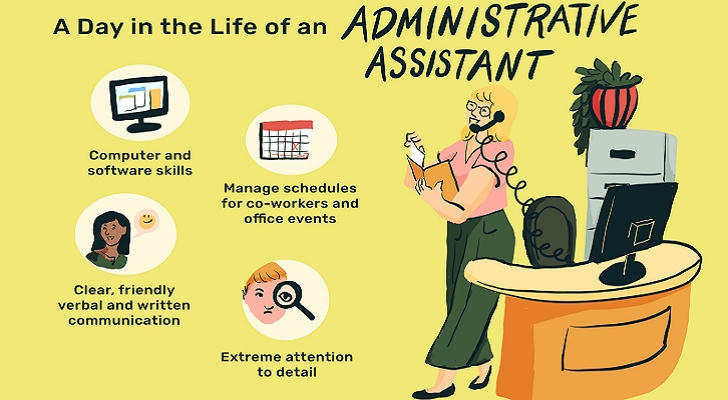The Backbone of Every Office: Why Administrative Assistants Are More Essential Than Ever
When people think of fast-paced, essential roles in the modern workplace, their minds often jump to managers, tech professionals, or customer service agents. But behind every efficient executive, organized team, and smooth-running office is one key person: the Administrative Assistant.
From scheduling and communications to project coordination and documentation, administrative professionals are the connective tissue of every organization. Whether in a corporate office, hospital, government agency, or nonprofit, their work keeps the wheels turning.
So, what does it take to become an Administrative Assistant in today’s world? What’s the career outlook, and how can someone get started—even without a college degree? Read on for a complete breakdown.

What Does an Administrative Assistant Do?
Administrative Assistants (often called “admins” or “office assistants”) provide day-to-day support to executives, departments, or entire organizations.
Their work can vary depending on the setting, but typically includes:
Answering phones and managing emails
Scheduling meetings, appointments, and travel
Preparing reports and presentations
Managing files and data entry
Assisting with project coordination
Supporting HR, accounting, or logistics tasks
Ordering office supplies and managing vendors
Acting as the first point of contact for clients or staff
In some industries, the role may evolve into Executive Assistant, Office Manager, or even Project Coordinator with experience.
Success in this role comes down to organization, communication, time management—and a calm attitude when chaos hits.
Industry Outlook: More Than Just “Office Work”
Despite the rise of automation and remote work, the demand for skilled Administrative Assistants remains strong—especially for those who are tech-savvy and adaptable.
According to the U.S. Bureau of Labor Statistics:
There were over 2.8 million Administrative Assistant jobs in the U.S. as of 2023.
Employment in this field is projected to remain steady, with stronger demand in healthcare, legal services, education, and government.
The shift to digital workplaces means admins now work with tools like Google Workspace, Microsoft 365, Zoom, Slack, and CRM software—skills increasingly sought after by employers.
As hybrid and remote workplaces continue to evolve, Administrative Assistants who can coordinate virtually, manage online calendars, and streamline digital communication are more essential than ever.
Where Do Administrative Assistants Work?
Every industry needs organizational support. Here are just a few sectors actively hiring Administrative Assistants:
Healthcare (hospitals, clinics, private practices)
Legal offices and government agencies
Education (schools, colleges, universities)
Corporate (tech, finance, marketing firms)
Nonprofits and foundations
Construction and real estate
Work environments may be fully in-person, hybrid, or remote depending on the employer.
Key Skills Employers Look For
To thrive as an Administrative Assistant, here’s what matters most:
Strong written and verbal communication
Excellent organizational skills
Proficiency with office software (Word, Excel, Outlook, Zoom, etc.)
Ability to multitask and prioritize
Problem-solving and decision-making
Confidentiality and professionalism
If you're the kind of person who loves planning, supporting others, and getting things done, this might be a natural fit.
How to Become an Administrative Assistant?
The path to becoming an Administrative Assistant is flexible—and you don’t need a four-year degree to get started.
Education Requirements:
Most entry-level positions require a high school diploma or GED.
Some employers prefer candidates with an associate degree in office administration, business, or communications.
Training Programs:
Many short-term training programs—online or in-person—can help you build job-ready skills.
Top options include:
Community College Certificate Programs in Office Administration (6–12 months) Online Courses from:
Coursera: Business Communication, Calendar & Schedule Management
LinkedIn Learning: Time Management, Microsoft 365 for Admins
Udemy: Virtual Assistant Mastery, Office Software Bootcamps
ed2go: Administrative Assistant Fundamentals

Certification: Stand Out from the Crowd
Though not always required, earning a professional certification can enhance your resume and increase your chances of promotion or specialization.
Popular Certifications Include:
| Certification | Issuing Body | Focus Area |
|---|---|---|
| Certified Administrative Professional (CAP) | International Association of Administrative Professionals (IAAP) | General admin skills, project coordination, communication |
| Microsoft Office Specialist (MOS) | Microsoft | Proficiency in Word, Excel, PowerPoint |
| Certified Virtual Assistant | Various online programs | For remote, freelance, or contract admin roles |
| QuickBooks Certification | Intuit | Great for those supporting accounting or finance departments |
Pro Tip: Many employers reimburse certification or training costs!
Career Growth Opportunities
Being an Administrative Assistant isn’t a dead-end job—it’s a springboard. With experience, many admins move into roles like:
Executive Assistant
Office Manager
HR Assistant or Coordinator
Project Manager
Operations Specialist
Some even use their role as a launchpad into fields like human resources, event planning, marketing, or business management.
Why Consider This Career Path?
Flexible entry: You can start without a degree
Transferable skills: Communication, tech, organization
Work across industries
Clear growth potential
Make a visible impact on your team and company
Final Thoughts
In a world that demands efficiency, responsiveness, and clear communication, Administrative Assistants are the glue holding modern organizations together.
If you're organized, detail-oriented, and love being the person others rely on—this might just be the career you've been looking for.
Whether you’re starting fresh, returning to work, or pivoting your path, there’s a place for you in this essential and evolving profession.
